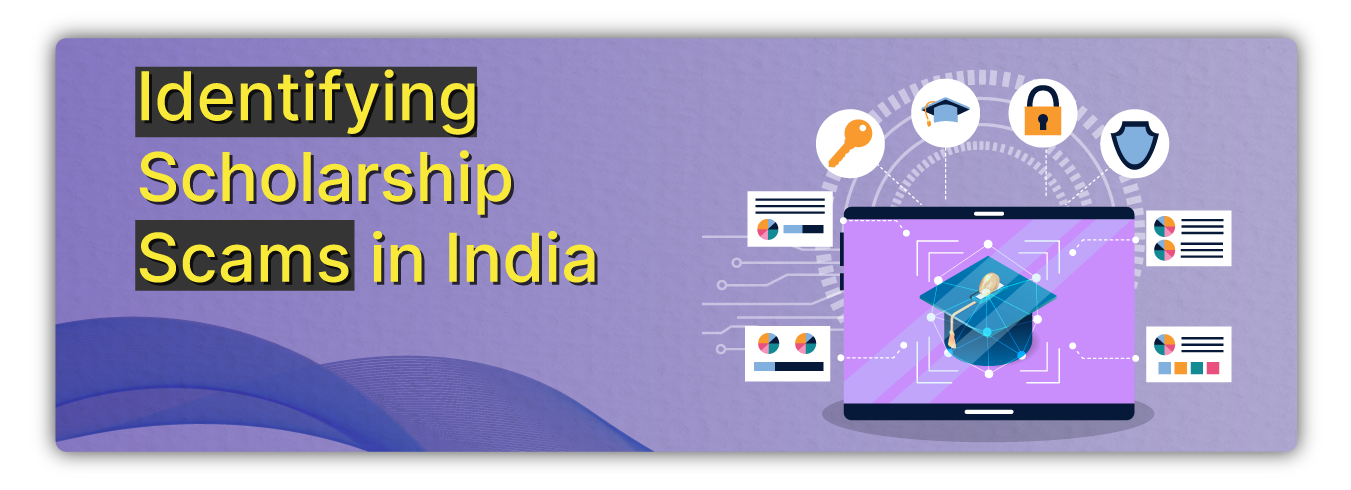The age of the Internet brings a pool of opportunities for students. They get a chance to learn a variety of things and in a variety of forms. The teaching-learning process becomes easy with the availability of online study material. Interactive teaching is now the most common method of teaching. Moreover, learners grasp the concepts quickly through this method and produce better learning outcomes. Another benefit of the internet includes the online availability of scholarships in India. Parents and students can get the entire information about scholarship programs through scholarship websites and apply online. Several fake websites run scams in the name of scholarship programs. Parents and students who are unaware of such frauds easily fall into their trap and lose money.
This blog is dedicated to helping you identify scholarship scams and securely apply for scholarships in India.
Signs of Scholarship Scams
You can identify if a scholarship program is real or a mere scholarship scam through certain signs and indications. Look out for the following signs when applying for online scholarships in India.
1. Charging Unusual Application Fees
Charging money is the biggest indication of a scholarship scam. The scammers often ask for money in the form of scholarship application fees. Students and parents who do not have adequate information about the scholarship programs fall into the trap of such scammers. However, legitimate scholarships do not require any money. The application fee is not applicable in such cases. Instead, students filling the scholarship application get scholarships if they fulfill the eligibility criteria and perform well in the scholarship test. Therefore, students, parents and even teachers must know that any financial aid program asking the money as an application fee can be a scholarship scam.
3. Asking Bank Account Number
The bank account number is the confidential information that the scammers keep looking for. The Banks keep updating the account holders about the scams that can happen just by sharing their account information. Therefore, students and parents must refrain from sharing their Bank details with anyone for getting scholarships. The consequences of doing so can include loss of money or misuse of your bank account for conducting fraud transactions. So, beware of such scholarship scams and be careful while sharing any personal information with strangers.
4. Offering Guaranteed Scholarships
Getting scholarships is not an easy task. It requires a lot of preparation and hard work to qualify for the examinations for getting scholarships in India. Also, numerous students take the scholarship examination every year. Therefore, there is a tough competition to qualify and no guarantee that a student will win. However, the thought of a guaranteed scholarship is a bait for needy students. Scholarship scams lure students into paying money on the pretext of providing guaranteed scholarships. But, the students must not rely on such claims. The only way to get a scholarship is by taking a scholarship test and qualifying it as per the eligibility criteria.
5. Claiming Open Access for Everyone
Although scholarships in India are available to all students, there are specific eligibility criteria for each of them. This means that despite the availability of scholarships for everyone, there are certain criteria for qualification. Therefore, if a scholarship program claims open access to everyone, you must know that it is a scholarship scam. Students and parents must research the scholarship beforehand to avoid such scammers.
6. Advertising High Success Rates
The world of social media has a lot of advantages. But at the same time, it is disadvantageous too. Scholarship scams become difficult to spot when the scammers show high success rates with the help of social media. They may use videos or other forms of graphic content to showcase their success rate. However, these are false claims to lure the students and parents and build their trust to believe the scholarship scam to be real. There is a need to find out about the legitimacy of the organization offering the scholarships before stepping ahead.
7. Creating False Sense of Urgency
A lot of scholarship scams earn money by reducing the time limits to apply and get scholarships for students. They do this through emails or other such messages urging the customers to pay the fees as early as possible. Also, some scammers apply the first-come, first-served strategy to create a sense of urgency. It makes the students anxious about losing the opportunity and they fall into the trap of such scholarship scams.
Therefore, students and parents must perform some good research and gain complete knowledge of a scholarship program before applying.
8. False Claims of Recognition
One of the biggest scholarship scams includes false claims of recognition. Several scammers make false claims of recognition from a Government organization or other such higher authorities. It helps them build trust so they can easily execute their malicious plan of looting the students and their parents. Therefore, the applicants must know that the government does not endorse private scholarships every time
With the help of the above-mentioned information and using your discretion, you can avoid getting scammed. Proper research and some presence of mind can help you get the right scholarship and avoid any unwanted situation.


